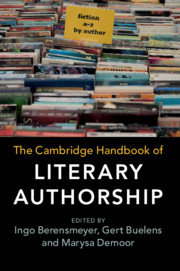Book contents
- The Cambridge Handbook of Literary Authorship
- The Cambridge Handbook of Literary Authorship
- Copyright page
- Contents
- Figures
- Contributors
- Acknowledgments
- Abbreviations
- Chapter 1 Introduction
- Part I Historical Perspectives
- Part II Systematic Perspectives
- Part III Practical Perspectives
- Chapter 20 Attribution
- Chapter 21 Anonymity and Pseudonymity
- Chapter 22 Plagiarism and Forgery
- Chapter 23 Authorship and Scholarly Editing
- Chapter 24 Copyright and Literary Property
- Chapter 25 Censorship
- Chapter 26 Publishing and Marketing
- Chapter 27 Institutions
- Select Bibliography
- Index
Chapter 23 - Authorship and Scholarly Editing
from Part III - Practical Perspectives
Published online by Cambridge University Press: 07 June 2019
- The Cambridge Handbook of Literary Authorship
- The Cambridge Handbook of Literary Authorship
- Copyright page
- Contents
- Figures
- Contributors
- Acknowledgments
- Abbreviations
- Chapter 1 Introduction
- Part I Historical Perspectives
- Part II Systematic Perspectives
- Part III Practical Perspectives
- Chapter 20 Attribution
- Chapter 21 Anonymity and Pseudonymity
- Chapter 22 Plagiarism and Forgery
- Chapter 23 Authorship and Scholarly Editing
- Chapter 24 Copyright and Literary Property
- Chapter 25 Censorship
- Chapter 26 Publishing and Marketing
- Chapter 27 Institutions
- Select Bibliography
- Index
Summary
In his famous lecture “Qu’est-ce qu’un auteur?” Michel Foucault paradoxically refers to the author Samuel Beckett when he quotes the line “Qu’importe qui parle,” which Foucault interprets in terms of indifference. The full quotation is “Qu’importe qui parle, quelqu’un a dit qu’importe qui parle” [“What matter who’s speaking, someone said what matter who’s speaking”]1 – which adds an important nuance. For even though the gist of the line is that the biography of the author may be irrelevant, it does indicate that even the questioning of authorship involves a “speaker” or “writer.” If one chooses not to include biographical research in literary criticism, this usually implies the exclusion of the “bio-” element; but it is harder to ignore the “graphical” facet, the fact that writings are written, by “someone.”
- Type
- Chapter
- Information
- The Cambridge Handbook of Literary Authorship , pp. 371 - 383Publisher: Cambridge University PressPrint publication year: 2019



